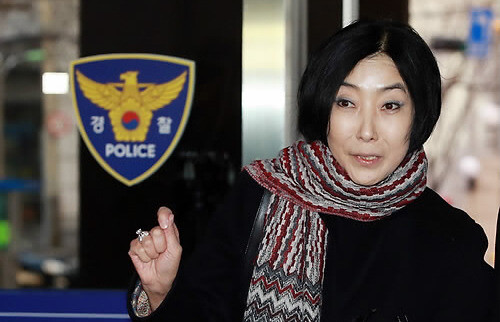hankyoreh
Links to other country sites 다른 나라 사이트 링크
Prosecutors seek warrant to deport Korean-American

Prosecutors requested an arrest warrant for former Democratic Labor Party deputy spokesperson Hwang Seon in connection with a lecture where she allegedly voiced pro-North Korean views.
Hwang, 41, is being investigated for praising/incitement and siding with the enemy, as well as possessing materials favorable to North Korea, both violations of the National Security Law. Prosecutors are also planning to deport Shin Eun-mi, a 54-year-old Korean American who is being investigated on the same charges.
Analysts are viewing the rare decision to arrest and/or deport individuals for allegedly “pro-North” remarks or writings as an attempt to drum up security concerns.
The second public security division of Seoul Central District Prosecutors‘ Office, under chief prosecutor Kim Byeong-hyun, requested the arrest warrant after concluding that Hwang and Shin had praised the North Korean regime with comments made during a Nov. 2014 joint lecture at Seoul’s Jogye Temple, part of a national tour by the two.
Previously, the security investigation team at Seoul Metropolitan Police Agency conducted an intensive investigation, including a search and seizure on Hwang’s home, after receiving a complaint from a conservative group. Police also investigated past activities by Hwang apart from the lecture in question.
Hwang dismissed reports that the prosecutors and police had found content in past lectures to students that were equivalent to North Korea’s arguments for a “juche revolution” in South Korean society.
“Just like they did at the time of the lecture, the prosecutors concluded that it was a National Security Law violation without checking the facts,” she said. “I see this as an operation aimed at creating a ‘frame.’”
Hwang sent on to note that her poetry collection “You Know How It Ends,” which the authorities viewed as materials favorable to North Korea, was published back in 2008.
“There was a publication event at the time at the Jogye Temple‘s traditional culture hall, and the publication was reported in the media,” she said. “They didn’t have a problem with it then, and I couldn‘t tell you why it’s suddenly an issue six years later.”
Prosecutors also reported that they had decided to pursue deportation for Shin, who holds US citizenship, and submitted an expulsion request to the Ministry of Justice’s Office of Immigration. The office is to decide the date of Shin’s departure.
According to the Immigration Control Act, deportation and entrance bans can be enforced for “individuals believed to pose a threat to the Republic of Korea’s interests, public safety, and the economic and/or social order.” Once deported, an individual is barred from returning to South Korea for five years.
Shin was investigated after a complaint charging her with making comments favorable to the North Korean regime during the November lecture. On Jan 7, prosecutors summoned her for questioning on whether she had intended to praise the North Korean regime with her talk concert comments and the book “A Korean-American Woman Goes to North Korea,” in which she recounts her experiences traveling in the North.
According to sources, prosecutors questioned Shin on whether she had intended to glorify North Korea with remarks about its “clean river water,” claims that “60% to 70% of defectors would like to visit their home,” and description of North Korea as a “land of opportunity.” Shin reportedly responded that her book and lecture were “not intended to praise North Korea.”
Prosecutors appear to have concluded that Shin’s comments in the lecture and books offer insufficient grounds for pressing criminal charges.
“If there is evidence of a crime, you indict - you don’t deport,” explained an official with the prosecutors on condition of anonymity. “Deportation applies when you’re not at the indictment stage, but when the conditions specified in the Immigration Control Act are met.”
Once deported, Shin plans to file an administrative suit demanding that the order be overturned.
By Jung Hwan-bong and Kim Kyu-nam, staff reporters
Please direct questions or comments to [english@hani.co.kr]

Editorial・opinion
![[Editorial] Does Yoon think the Korean public is wrong? [Editorial] Does Yoon think the Korean public is wrong?](https://flexible.img.hani.co.kr/flexible/normal/500/300/imgdb/original/2024/0417/8517133419684774.jpg) [Editorial] Does Yoon think the Korean public is wrong?
[Editorial] Does Yoon think the Korean public is wrong?![[Editorial] As it bolsters its alliance with US, Japan must be accountable for past [Editorial] As it bolsters its alliance with US, Japan must be accountable for past](https://flexible.img.hani.co.kr/flexible/normal/500/300/imgdb/original/2024/0417/6817133413968321.jpg) [Editorial] As it bolsters its alliance with US, Japan must be accountable for past
[Editorial] As it bolsters its alliance with US, Japan must be accountable for past- [Guest essay] Amending the Constitution is Yoon’s key to leaving office in public’s good graces
- [Editorial] 10 years on, lessons of Sewol tragedy must never be forgotten
- [Column] A death blow to Korea’s prosecutor politics
- [Correspondent’s column] The US and the end of Japanese pacifism
- [Guest essay] How Korea turned its trainee doctors into monsters
- [Guest essay] As someone who helped forge Seoul-Moscow ties, their status today troubles me
- [Editorial] Koreans sent a loud and clear message to Yoon
- [Column] In Korea’s midterm elections, it’s time for accountability
Most viewed articles
- 1[Column] The clock is ticking for Korea’s first lady
- 2[Editorial] When the choice is kids or career, Korea will never overcome birth rate woes
- 3[Guest essay] How Korea turned its trainee doctors into monsters
- 4[Editorial] As it bolsters its alliance with US, Japan must be accountable for past
- 5S. Korea, Japan reaffirm commitment to strengthening trilateral ties with US
- 6Korea, Japan jointly vow response to FX volatility as currencies tumble
- 7Gangnam murderer says he killed “because women have always ignored me”
- 8Japan officially says compensation of Korean forced laborers isn’t its responsibility
- 9[News analysis] After elections, prosecutorial reform will likely make legislative agenda
- 10‘Right direction’: After judgment day from voters, Yoon shrugs off calls for change